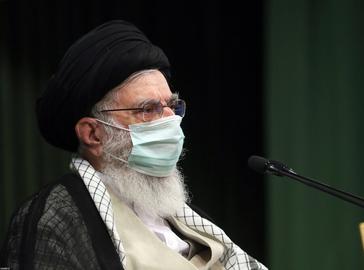On October 22, eight months into the crisis, Ayatollah Khamenei issued a fatwa regarding coronavirus, reiterating the basic rules for how to deal with the pandemic. When asked what duties an individual had when dealing with coronavirus, he said If someone knows they are infected and that they might transmit the virus, they must avoid contact with others. Going to places where there might be a possibility of infection must be avoided unless health guidelines are followed, he said. He provided no further details or guidance.
On the same day, the heads of the National Coronavirus Taskforce’s committees met with President Rouhani, who chaired the meeting. New orders were set out to cope with the deteriorating situation, including restrictions in 43 cities across Iran. “Performing extensive, targeted and smart testing must be the priority of the Treatment Committee,” Rouhani said at the meeting. He called for the “smart” tracing of coronavirus patients during the required period of quarantine and announced that 50 percent of government employees could work remotely for the next month.
However, the National Coronavirus Taskforce has approved similar guidelines and restrictions in a more limited extent in recent weeks. So far, these measures have not had the intended impact and have not helped drive down the number of coronavirus cases in the country. The public has ignored government restrictions, and the government has not done much to enforce them.
The daily death toll from Covid-19 was over 300, continuing the trend in recent days and bringing the official death toll since the pandemic started to 31,650. However, according to a number of health experts, the actual figure for fatalities is at least double that.
After eight months of fighting the pandemic, health ministry officials concede that health workers are “exhausted and worn out.” Not only have they been working non-stop, many of them have not been paid, partially because money that was supposed to be allocated to deal with the coronavirus crisis has failed to materialize. Meanwhile, Covid-19 mortality and infection rates among medical staff have also contributed to the severe shortage of medical manpower in hospitals.
“Half of the health workers and medical staff at hospitals are suffering from psychological problems,” said Jalil Kouhpayeh, president of Iran University of Medical Sciences. “Unlike physical disorders, psychological problems do not have specific causes. Rather, they originate from issues that, after a long period of time, wear out the mind. In this case, the psychological problems of most health workers and medical staff at hospitals are caused by their non-stop work in coronavirus wards.”
Provinces Round-up
Ali Akbar Ashouri, director of management for the Ministry of Roads, predicted that traffic would be very heavy on the highways between Tehran province and the scenic northern provinces from Thursday, October 23 until the evening of Sunday, October 25.
The number of coronavirus infections in Rasht, the capital of Gilan province, has doubled, according to Governor Ali Fathollahi, who said that visitors were continuing to travel to the province, making the situation worse. He also reported that parks and recreation areas in the city had been closed down.
In the 24-hour period spanning October 21 and October 22, 211 new coronavirus patients were hospitalized in Kermanshah province, bringing the total number of hospitalized cases to 778, announced Mehdi Mohammadi, head of Kermanshah University of Medical Sciences’ Coronavirus Information Committee.
Alborz province is still in a red state of alert, infections are on the rise and, therefore, restrictions in the province have been extended for an additional week, from October 24 to October 30, reported Ali Darvishpour, acting director of Alborz Coronavirus Taskforce.
Similarly, officials in West Azerbaijan province have also extended restrictions for another week. The restrictions were initially imposed at the beginning of October.
In most provinces that have imposed restrictions, universities, schools, student dormitories, seminaries, technical and vocational schools, childcare centers, libraries, museums, indoor swimming pools, cinemas, theaters and parks have been shut down. Added to this has been the closure of reception halls, beauty salons, mosques and prayer centers, coffee shops, zoos, and gyms. Contact sports such as wrestling, karate and judo have been banned, as have social, cultural, and religious ceremonies and gatherings and Friday prayers.
In her daily briefing for October 22, the health ministry spokeswoman Dr. Sima Sadat Lari announced the official coronavirus statistics for the last 24 hours:

Dr. Lari also reported that, out of the 31 Iranian provinces currently 30 provinces are still in a high state of alert:

This is part of IranWire's coronavirus chronology. Read the full chronology
visit the accountability section
In this section of Iran Wire, you can contact the officials and launch your campaign for various problems



























comments